It looks like you're using an Ad Blocker.
Please white-list or disable AboveTopSecret.com in your ad-blocking tool.
Thank you.
Some features of ATS will be disabled while you continue to use an ad-blocker.
share:
reply to post by deadmessiah
Your not telling the entire story here you know that. First each of these companies had subsidiaries in either France or Germany. They were separate offices run by french and Germans there reports only lasted until 1942 when Hitler nationalized all the industries. Of course these companies worked with Hitler there executives knew what was coming they weren't stupid. As for there American counterparts its unknown how much contact they did maintain after nationalization but im sure it wasn't much since the gestapo would have seen that as espionage. So take your evil corporations crap and sell it somewhere else You do realize it was Henry Ford that was placed in charge of war time production and without him the wartime production goals would never have been attainable.
Your not telling the entire story here you know that. First each of these companies had subsidiaries in either France or Germany. They were separate offices run by french and Germans there reports only lasted until 1942 when Hitler nationalized all the industries. Of course these companies worked with Hitler there executives knew what was coming they weren't stupid. As for there American counterparts its unknown how much contact they did maintain after nationalization but im sure it wasn't much since the gestapo would have seen that as espionage. So take your evil corporations crap and sell it somewhere else You do realize it was Henry Ford that was placed in charge of war time production and without him the wartime production goals would never have been attainable.
You seriously need to brush up on your history. Yes, Henry Ford did a lot to help our war effort, but he also did a lot to help Hitler. Hitler awarded
him the Grand Service Cross of the Supreme Order of the German Eagle. James Mooney of GM received a similar medal for his "distinguished service to
the Reich." And while other subsidiaries of the American corporations were nationalized, Henry Ford's German plant was not.
Its a good read: www.washingtonpost.com...
No, they didn't shoot the gun, they just supplied the gun and ammunition. They tried very hard to cover their tracks too.
In certain instances, American managers of both GM and Ford went along with the conversion of their German plants to military production at a time when U.S. government documents show they were still resisting calls by the Roosevelt administration to step up military production in their plants at home.
The Schneider report, now available to researchers at the National Archives, states that American Ford agreed to a complicated barter deal that gave the Reich increased access to large quantities of strategic raw materials, notably rubber. Author Snell says that Nazi armaments chief Albert Speer told him in 1977 that Hitler "would never have considered invading Poland" without synthetic fuel technology provided by General Motors.
Its a good read: www.washingtonpost.com...
No, they didn't shoot the gun, they just supplied the gun and ammunition. They tried very hard to cover their tracks too.
No body who knows world history, and it does differ from American history, denies the effort and sacrifice of the U.S however there is a trend of
Americans to believe that the U.S won the war which isn't true. The U.S broke the stalemate. The U.S enterd the war with untrained inexperienced
forces and it showed in the beggining. History also shows that the U.S often didn't take the advice of it's allies who'd been fighting since 1939.
When U.S forces first arrived in England they were given a bookle from the U.S defence force. That booklet explained to them that there was nothing they could say or do to impress the English that was because England knew war and the average london child had more combat experience than the average American soldier.
The lend lease thing in truth was unfare. England was giving up bases and empire for things such as ww1 warships.
The U.S played a major role and acheived some great things but it did not win the war on its own and it couldn't have done so. and alot of the time the enemy was already worn out or punch drunk before the U.S got there.
When U.S forces first arrived in England they were given a bookle from the U.S defence force. That booklet explained to them that there was nothing they could say or do to impress the English that was because England knew war and the average london child had more combat experience than the average American soldier.
The lend lease thing in truth was unfare. England was giving up bases and empire for things such as ww1 warships.
The U.S played a major role and acheived some great things but it did not win the war on its own and it couldn't have done so. and alot of the time the enemy was already worn out or punch drunk before the U.S got there.
edit on 2-10-2011 by steveknows because: (no reason
given)
edit on 2-10-2011 by steveknows because: (no reason given)
edit on 2-10-2011 by steveknows because: (no reason
given)
All I'm going to say is.
I genuinely believe the allies could've beat the Nazi's without our friends from accross the Atlantic. As a Brit, I'm proud of our armed forces even to this day, our Army is the most well respect, well trained and well disciplined in the world.
However, I'm sure the Brits that were around during the World War was very grateful to America for their help. I for one am, even though I was born in the 90's, to this day I'm grateful. Our American friends saved a heck of a lot of lives. And to this day, Britain and America will always have the biggest and best alliance in the WORLD. Like, I've said before, we'll always have America's back.
I genuinely believe the allies could've beat the Nazi's without our friends from accross the Atlantic. As a Brit, I'm proud of our armed forces even to this day, our Army is the most well respect, well trained and well disciplined in the world.
However, I'm sure the Brits that were around during the World War was very grateful to America for their help. I for one am, even though I was born in the 90's, to this day I'm grateful. Our American friends saved a heck of a lot of lives. And to this day, Britain and America will always have the biggest and best alliance in the WORLD. Like, I've said before, we'll always have America's back.
reply to post by steveknows
a couple things about the lend-lease, Britain needed escort ships, and the US needed land for it's troops, and the lease was for 99 years on the bases.
The countries only had to pay for what they didn't return.
After Dunkirk, while the British army had almost nothing in the way of heavy equipment and small arms, the US sent:
500,000 .30 cal. rifles with 250 rounds each
900 75mm field guns with 1,000,000 rounds
80,000 machine guns
and various other items.
The US also wound up sending the Soviet Union (approx.) 13,000,000 pairs of boots. By doing so that freed up Soviet factories to make weapons, ammo, and other necessary items.
I guess who got the better end of the deal depends on what side of the fence you're standing on.
You may have already known this stuff, but just in case, there it is.
Yes you are VERY correct about the inexperience showing, even in leadership, the Kasserine Pass is about as perfect example as anyone can get.
a couple things about the lend-lease, Britain needed escort ships, and the US needed land for it's troops, and the lease was for 99 years on the bases.
The countries only had to pay for what they didn't return.
After Dunkirk, while the British army had almost nothing in the way of heavy equipment and small arms, the US sent:
500,000 .30 cal. rifles with 250 rounds each
900 75mm field guns with 1,000,000 rounds
80,000 machine guns
and various other items.
The US also wound up sending the Soviet Union (approx.) 13,000,000 pairs of boots. By doing so that freed up Soviet factories to make weapons, ammo, and other necessary items.
I guess who got the better end of the deal depends on what side of the fence you're standing on.
You may have already known this stuff, but just in case, there it is.
Yes you are VERY correct about the inexperience showing, even in leadership, the Kasserine Pass is about as perfect example as anyone can get.
edit on 4-10-2011 by Yahm16 because: (no reason given)
of COURSE we would have won it, given the nukes. Had we had them 3 years earlier, some places in Europe would still be radioactive, and Russia would
never have gotten a toe hold on E Europe.
Originally posted by wonner
of COURSE we would have won it, given the nukes. Had we had them 3 years earlier, some places in Europe would still be radioactive, and Russia would never have gotten a toe hold on E Europe.
The atomic info was given to the U.S by the Brits, and no Im not a Brit. Also it was with the help of German scientists the it was developed. When it came to the "A bomb" the U.S was way behind both England and Germany until both those countries aided the U.S in its development.
Originally posted by wonner
yeah, and without a MASSIVE effort by the US, nukes probably STILL wouldn't exist. The fact is, we got them, and we USED them, but now we lack the political will to use them as we should, on every major Muslim city in the world, and rid mankind of the worst pestilence ever unleashed against us.
hey I don't disagree with you that they should be used on you know who but it's not a case of a localised A bomb anymore.
And had England and even perhaps Germany kept up with it's efforts they would have had the bomb in a few years. In fact U.S engineers build a life size bodel of a stealth bomber the Germans were working on and tested it under ww2 radar conditions and this thing passed and would have reached the U.S. At the same time the Germans were working on the bomb so it would been bad news.
news.nationalgeographic.com...
The Second World War was not won by one nation; the Allies had to cooperate while fighting on the ground, as well as by sharing technological resources and innovations. There are various ways in which the allies cooperated, including the American lend lease scheme and hybrid weapons such as the Sherman Firefly.
The origin of the cooperation stemmed from a 1940 visit by the Aeronautical Research Committee chairman Henry Tizard that arranged to transfer UK military technology to the US in case of the successful invasion of the UK that Hitler was planning as Operation Sea Lion. Tizard led a British technical mission, containing details and examples of British technological developments in fields such as radar, jet propulsion and also the early British research into the Atomic bomb. One of the devices brought to the US by the Mission, the resonant cavity magnetron, was later described as "the most valuable cargo ever brought to our shores".
edit on 11-10-2011 by steveknows because: (no reason given)
the german nuke effort was a joke, like the dummy from Iraq's. The Brits lacked many of the needed resources, like money, U235, and the all out brain
power. The bomb was a major effort, by a million brilliant dedicated people, for years and billions of $. England had nothing like those kind of
resources, and hasn't had, since ww1. She wouldn't have nukes today, like France wouldn't, if we hadn't given them to them.
The Soviet Union had 8 million military casualties during world war 2 and 14 million civillian casualties during WW2 with a population of over 186,000,000 total people the USA had 416,000 military deaths with a population of over 131,000,000 total people with only around 1000 civilian deaths... now the Soviet Union had around 13.50% total population lost as compared to 0.32% lost in the USA...
Last time I checked, war isn't about dieing for your country, it's about making some other poor bastard die for his.
Originally posted by steveknows
One of the devices brought to the US by the Mission, the resonant cavity magnetron, was later described as "the most valuable cargo ever brought to our shores".
The resonant cavity magnetron with its contributions to both miniaturization and exponentially more powerful high(er) resolution radar was unquestionably one of the most important weapons developed during the 1940's.
A related technology also born from The Tizard Mission became one of the few weapons innovations to honestly become a game changer overnight, specifically in the form of the radio detonated proximatey fuse.
In the words of U.S. Army General George S. Patton: "The new shell with the funny fuze is devastating. ... I think that when all armies get this shell, we will have to devise some new method of warfare. I am glad you all thought of it first."
Not quite as eloquent as James Phinney Baxter III "most valuable cargo" quote but tremendous praise from a truly great strategist and professional soldier who understood technologies importance to the order of battle.
reply to post by JohnnySasaki
Last time I checked, war isn't about dieing for your country, it's about making some other poor bastard die for his.
Speak of the devil, great quote!
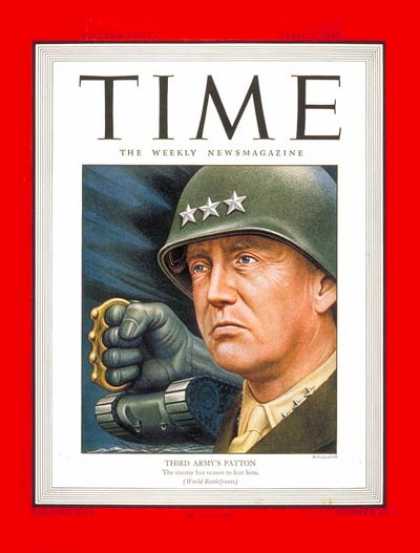
More casualties do not equate to harder or more fighting. It only show how poorly trained, under supplied armies can't win by the strategy of
armchair generals.
reply to post by steveknows
The atomic info was given to the U.S by the Brits, and no Im not a Brit. Also it was with the help of German scientists the it was developed. When it came to the "A bomb" the U.S was way behind both England and Germany until both those countries aided the U.S in its development.
In the interest of keeping the record straight....
The U.S. fission weapon program began in 1939 with the Einstein–Szilárd letter
The Einstein–Szilárd letter was a letter sent to the United States President Franklin D. Roosevelt on August 2, 1939, that was signed by Albert Einstein but largely written by Leó Szilárd in consultation with fellow Hungarian physicists Edward Teller and Eugene Wigner.
The letter suggested that the U.S. should begin its own research because of the potentially vast destructive power of atomic bombs.
Einstein, Szilárd, Teller and Wigner were among a number concerned scientists who initially feared Nazi Germany would develop the weapon first.
The only real contribution by the British during the development of the U.S. program was the realization that a much smaller amount of fissile material was needed to achieve a critical mass than had been assumed (pounds rather than tons of Uranium).
This information was called The Frisch–Peierls memorandum and was given to the researchers in the U.S. nuclear program.
The Frisch-Peierls_memorandum was a revelation for the practical development of a deliverable nuclear weapon and provided the impetus for FDR to green light the bomb as a full scale development project.
Wiki summarizes consequent events of early U.S./U.K. nuclear collaboration...
The British and Americans exchanged nuclear information but did not initially pool their efforts.
Britain rebuffed attempts by Bush and Conant in 1941 to strengthen cooperation with its own project, codenamed Tube Alloys. However, the United Kingdom could not muster the manpower or resources of the United States, and despite its early and promising start, Tube Alloys soon fell behind its American counterpart.
On 30 July 1942, Sir John Anderson, the minister responsible, advised Churchill that: "We must face the fact that ... [our] pioneering work ... is a dwindling asset and that, unless we capitalise it quickly, we shall be outstripped. We now have a real contribution to make to a 'merger.' Soon we shall have little or none."
By this time, the British bargaining position had worsened, and their motives were mistrusted by the Americans. Collaboration lessened markedly, and the exchange of information stopped
Collaboration with the United Kingdom
Regarding the comment that Germany was ahead in development of a fission weapon or that Germany in any way aided the U.S... You may want to double check your source.
It is unquestionable that many of the key figures in various facets of the Manhattan Project were Americans of German decent, naturalized German immigrants and German scientific ex-patriots played a substantial role (Albert Einstein immigrated to the U.S. with a German passport)
Beyond the short sighted Nazi racial policies alienating some of Germany brightest minds, the only assistance Germany could be credited with is providing the motivation to build it in the first place.
German nuclear research was never the threat some feared as well. After the war a subset of Operation Paperclip named Operation Alsos was aimed at Germany's Nuclear program.
The results were disappointing, as summarized by wiki...
In the end, Operation Alsos concluded that the Allies had surpassed the entire German atomic bomb effort by 1942. Compared to the Manhattan Project (one of the largest scientific and engineering projects in history), the German project was considerably underfunded and understaffed, and it is questionable whether Germany would have had the resources or concentrated research attention which the Allies used to produce such a weapon.
Operation Alsos
Many people don't understand that the A-bomb was not simply a matter of figuring out some clever trickery, it required an massive infrastructure to refine the oar, entire damns were built solely to generate the power for the centrifuges etc.
The massive domestic investment required is a point often lost on the historical revisionists who would have people believe that both Germany and Japan had advanced weapons programs, some of the more ambitious stories go so far as to suggest that Germany or Japan respectively detonated a fission weapon in 1945.
It is utter drivel but that doesn't stop the stories from making the rounds.
reply to post by steveknows
In fact U.S engineers build a life size bodel of a stealth bomber the Germans were working on and tested it under ww2 radar conditions and this thing passed and would have reached the U.S. At the same time the Germans were working on the bomb so it would been bad news.
news.nationalgeographic.com...
Alas, no proper WWII thread would be complete without mention of the Horton brothers Ho-229 and how it almost was going to win the war for Germany.
While a clearly impressive design, the projected performance was far less than what would be required to carry the 10,000 lb payload of a first generation fission weapon 4000 miles one way from Berlin to Washington D.C.
It was given the personal approval of German Luftwaffe Reichsmarschall Hermann Göring, and was the only aircraft to come close to meeting his "3x1000" performance requirements, namely to carry 1000 kg (2200lbs) of bombs a distance of 1000 km (620 miles) with a speed of 1000 km/h (620MPH). Its ceiling was 15,000 meters (49,213 ft)
Horten Ho 229
If I may so bold as to quote myself from another thread...
reply to post by Drunkenparrot
The brilliant aeronautical engineers of 1930's and 40's National Socialist Germany unquestionably made huge contributions to modern aviation but in all fairness it should also be remembered that the Reichsluftfahrtministerium ( German Ministry of Aviation or RLM abbreviated) were often victims of their own often overly ambitious imaginations and even the very few late war designs that found their way into prototype were nearly all so badly flawed as to have had no possible future as military programs.
The most highly evolved of the German wings was the Horton IX aka HP-229 and regardless of what "secret Nazi wonder weapons" on the history channel would have folks believe it was far from a success. Only six were built, only 2 of those were briefly flown and only 1 of those was powered and it was lost by a crash early on.
There is a bit of a current trend to romanticize the Ho-229 by crediting it with theoretical performance and inferring it was an inspiration for modern stealth and both are far from the truth. The real story isn't nearly as exciting. The one powered prototype was never flown faster than a couple of hundred kmh or higher than .5km.
The HP-229 had zero influence on the B-2. Often neglected from mention in modern stories of the German "wonder weapon" is that at the same time of the Horton brothers Jack Northrop was designing tailless aircraft as well with the added caveat that after WW2 the Horton brothers were forgotten while Northrop went on to successfully engineer both the YB-35 and YB-49 strategic bomber. They ultimately failed for a few reasons, incurable yaw instability a big one due to no computer fly by wire in the 50's. The resurgence of the tailless wing design in the B-2 had little more than basic plan form in common with Northrop's wings of the 50's had absolutely no part of their lineage in common with the HO-229.
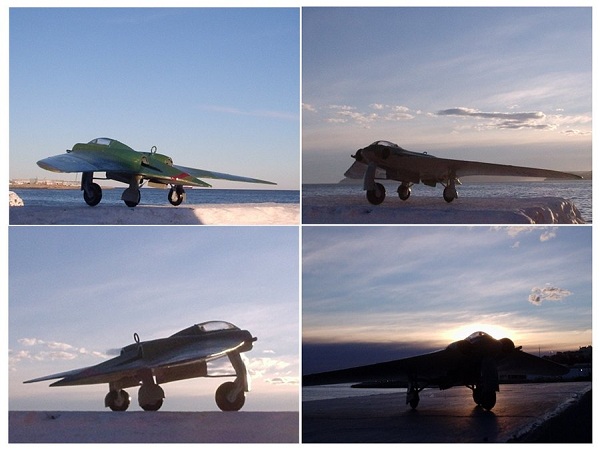
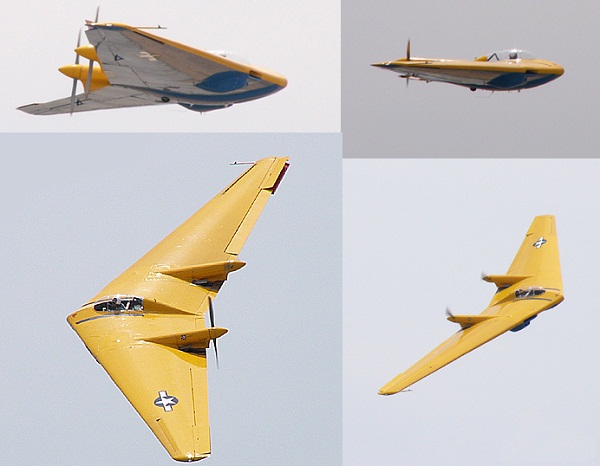
It is worth noting that both the U.S. postwar wing designs had sufficient range and payload to deliver a nuclear weapon on an intercontinental sortie.
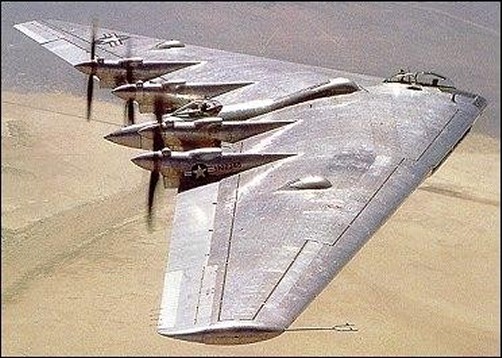
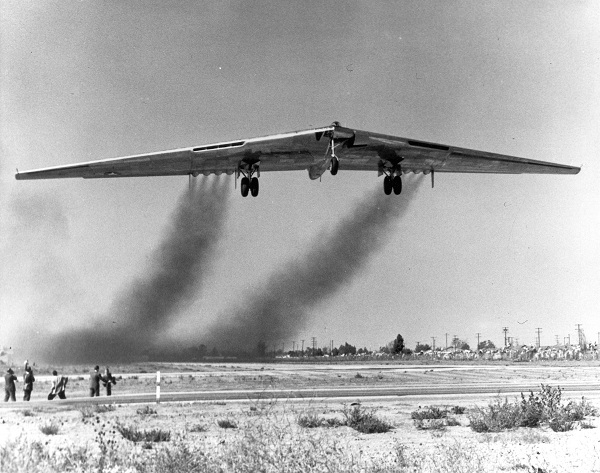
There are various ways in which the allies cooperated, including the American lend lease scheme and hybrid weapons such as the Sherman Firefly.
Interesting choice using the big gun M4 as an example.
I would have guessed the Rolls Royce/Merlin powered P-51 B/C/D to have been the ultimate success story of British/U.S. technological integration during WWII...
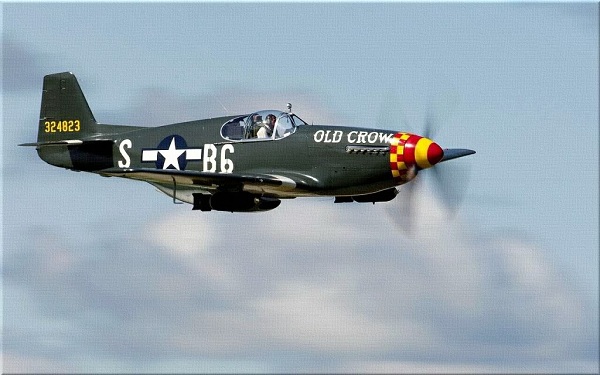
edit on 14-10-2011 by Drunkenparrot because: (no reason given)
Hm, I know everyone is welcome to their opinion...but seriously.
IMO, if ONE US citizen lost their life, that is ONE family destroyed, ONE wife without a husband. And for that I'd be eternally grateful. I'd say that dude's name out loud every November 11th.
I think, I hope, that one day when you've grown up, you'll come back on this thread and say how much you regret this thread, and show some respect.
I even respect the German, Japanese and Italian dead, they were just young men doing their jobs for the most part.
It's not a competition.
ANOTHER WAY TO LOOK AT IT:
Nearly 500,000 US servicemen lost their lives fighting for countries thousands of miles away. For you and me, strangers and people they never met.
They could have said screw Europe, lets just concentrate on Japan.
But they didn't, brave men.....braver than you.
IMO, if ONE US citizen lost their life, that is ONE family destroyed, ONE wife without a husband. And for that I'd be eternally grateful. I'd say that dude's name out loud every November 11th.
I think, I hope, that one day when you've grown up, you'll come back on this thread and say how much you regret this thread, and show some respect.
I even respect the German, Japanese and Italian dead, they were just young men doing their jobs for the most part.
It's not a competition.
ANOTHER WAY TO LOOK AT IT:
Nearly 500,000 US servicemen lost their lives fighting for countries thousands of miles away. For you and me, strangers and people they never met.
They could have said screw Europe, lets just concentrate on Japan.
But they didn't, brave men.....braver than you.
edit on 14-10-2011 by kiwifoot because: edit
There's no "I" in team. There were a lot of dynamics in WWII that alone can be scrutinized as, "Oh, XXXXX[country] didn't do that much...." but
when taken as a part of the whole, they amount to a great deal.
How did the British (just for the record, I am British) fare in the war against the Japanese? Not that well, really. The Australians? Put up an incredible fight, but didn't beat them.
Without the USA's "Island hopping" strategy, the Japanese would have dominated.
How did the venerable "Churchill" tank do against the might of the Tiger? Not that well... The British relied quite heavily on the LRDG (and their hit-and-run tactics) in desert warfare as they just couldn't stand toe-to-toe with the Wehrmacht.
Someone mentioned the battle of the Bulge. How would the allies have fared without the USA?
Sheer numbers - not superior weaponry - won the day. Had the US not been there, it would have turned into another Dunkirk. Sure, the Falais Gap was a dark piece of strategy, but it did turn the tide. The Americans were part of D-Day, but so were the British and the Canadians. We won't even go into the whole Dieppe thing. Poor guys.
Nobody 'Won' WWII. The Axis was defeated, but not by any one nation. It was a team effort.
Someone mentioned the Mustang being a great fighter. It was, once it got a RR Merlin engine. Teamwork!
Nobody ever wins a war. There's just those who didn't win.
Counting casualties is silly, and a great disservice to all those who fought and died, or who fought and survived.
Everyone contributed, and everyone was part of the end of WWII. From "Rosie the riveter" to the "land girls" to the B-17 crews, to the "Cockleshell heroes" to the grunts who just brought the food to the front. Everyone.
No fighting force was supreme. They all relied heavily on the many support staff, and to the backroom boys with their maps and strategies. You can't say the US marines fought any less hard than the BEF. You can't point at the 101st Airborne as supreme over the 'Desert Rats.' They all did a particular job, and did it well. The result was that the Axis surrendered and the world was [relatively] at peace once more.
Don't make this about one nation over another. Everyone sacrificed. Everyone did their bit.
I traced that a relative of mine was in the UK's code breaking team. She's every bit a hero as much as the guys who raised the flag on Iwo Jima.
How did the British (just for the record, I am British) fare in the war against the Japanese? Not that well, really. The Australians? Put up an incredible fight, but didn't beat them.
Without the USA's "Island hopping" strategy, the Japanese would have dominated.
How did the venerable "Churchill" tank do against the might of the Tiger? Not that well... The British relied quite heavily on the LRDG (and their hit-and-run tactics) in desert warfare as they just couldn't stand toe-to-toe with the Wehrmacht.
Someone mentioned the battle of the Bulge. How would the allies have fared without the USA?
Sheer numbers - not superior weaponry - won the day. Had the US not been there, it would have turned into another Dunkirk. Sure, the Falais Gap was a dark piece of strategy, but it did turn the tide. The Americans were part of D-Day, but so were the British and the Canadians. We won't even go into the whole Dieppe thing. Poor guys.
Nobody 'Won' WWII. The Axis was defeated, but not by any one nation. It was a team effort.
Someone mentioned the Mustang being a great fighter. It was, once it got a RR Merlin engine. Teamwork!
Nobody ever wins a war. There's just those who didn't win.
Counting casualties is silly, and a great disservice to all those who fought and died, or who fought and survived.
Everyone contributed, and everyone was part of the end of WWII. From "Rosie the riveter" to the "land girls" to the B-17 crews, to the "Cockleshell heroes" to the grunts who just brought the food to the front. Everyone.
No fighting force was supreme. They all relied heavily on the many support staff, and to the backroom boys with their maps and strategies. You can't say the US marines fought any less hard than the BEF. You can't point at the 101st Airborne as supreme over the 'Desert Rats.' They all did a particular job, and did it well. The result was that the Axis surrendered and the world was [relatively] at peace once more.
Don't make this about one nation over another. Everyone sacrificed. Everyone did their bit.
I traced that a relative of mine was in the UK's code breaking team. She's every bit a hero as much as the guys who raised the flag on Iwo Jima.
Originally posted by Drunkenparrot
reply to post by JohnnySasaki
Last time I checked, war isn't about dieing for your country, it's about making some other poor bastard die for his.
Speak of the devil, great quote!
Yea, you can quote Patton all day.
edit on 15-10-2011 by JohnnySasaki because: Patton!
Its obvious they didnt do asmuch as they make out i mean cmon canada was part of the british colonys and we were at war with germany, russia, italy, japan before the americans joined in and we are still holding our own. The only thing that the yanks did do alot of is bring supplies when they entered the war, other than that its always about the americans winning it you never hear about how hard the british, canadian, indian, australian, chinese fought before they joined and even afterwards its always how AMERICA won the war
Originally posted by misterbananas
alot of Americans say that their country was the big hero in WW2 they always say that they did the most to win the war. but they didn't even fight as hard as the The Soviet Union did... The Soviet Union had 8 million military casualties during world war 2 and 14 million civillian casualties during WW2 with a population of over 186,000,000 total people the USA had 416,000 military deaths with a population of over 131,000,000 total people with only around 1000 civilian deaths... now the Soviet Union had around 13.50% total population lost as compared to 0.32% lost in the USA... now they also say that Canada did not do as much as they did. we had .40% population lost with 0 Civillian casualties, also Canada had been the first country to declare war on Germany. (September 9th 1939.)
US Ammunition was being made in 1939 and sold to Nazi Germany until Decemeber 1941 which is when Pearl Harbour happened and then the USA declared war on Japan and then Germany, Japan's allie, declared war on the USA, the things sold to Germany until 1941 would include mortars and bullets.
[I know how poorly written this actually is but you should just make it understandable in your head so you could get my point]
Now, americans always talk about fighting nazis in World War 2 but if you try to find them actually doing so on a search engine you will not find barely anything about the USA in Germany inbetween 1941-1945 except Omaha and Utah squadrons on the beach in Normandy being the only times i could find records of the USA fighting Germany... not to mention the war in Japan had continued 2 months after the war in Europe. yes I do know of the POW camps in Canada i live near one, Neys Park, where Japanese people were held obviously as Prisoners Of War.
I missed alot so feel free to PM me alot of the Facts I missed, have a good day ATS.
oh yea and the point of this was that they didn't do as much as they say in Europeedit on 2011/15/8 by misterbananas because: no reason.
Originally posted by therealcatman
I would like 2 know where the guy who started this thread is from?????
Italy
Originally posted by requirement
the german nuke effort was a joke, like the dummy from Iraq's. The Brits lacked many of the needed resources, like money, U235, and the all out brain power. The bomb was a major effort, by a million brilliant dedicated people, for years and billions of $. England had nothing like those kind of resources, and hasn't had, since ww1. She wouldn't have nukes today, like France wouldn't, if we hadn't given them to them.
Utter bollocks.
The US gained a jumpstart into Nuclear Weapons with the Tube Alloys info we gave in the Tizzard mission to the US. Also, British and Canadian scientists were very central to the Manhattan project.
After the war, the US simply shut up shop and the UK had to start from scratch. We achievevd a thermonuclear device only a couple of years after the US on our own accord. Then the US decided they would share tech but even to this day we design and build our own warheads.
new topics
-
Planned Civil War In Britain May Be Triggered Soon
Social Issues and Civil Unrest: 53 minutes ago -
Claim: General Mark Milley Approved Heat and Sound Directed Energy Weapons During 2020 Riots
Whistle Blowers and Leaked Documents: 2 hours ago
top topics
-
Claim: General Mark Milley Approved Heat and Sound Directed Energy Weapons During 2020 Riots
Whistle Blowers and Leaked Documents: 2 hours ago, 5 flags -
Planned Civil War In Britain May Be Triggered Soon
Social Issues and Civil Unrest: 53 minutes ago, 1 flags
active topics
-
Claim: General Mark Milley Approved Heat and Sound Directed Energy Weapons During 2020 Riots
Whistle Blowers and Leaked Documents • 10 • : marg6043 -
Gravitic Propulsion--What IF the US and China Really Have it?
General Conspiracies • 26 • : fringeofthefringe -
Ukraine halts transit of Russian gas to Europe after a prewar deal expired
Political Conspiracies • 146 • : xuenchen -
Sorry to disappoint you but...
US Political Madness • 37 • : matafuchs -
The Truth about Migrant Crime in Britain.
Social Issues and Civil Unrest • 24 • : angelchemuel -
Trudeau Resigns! Breaking
Mainstream News • 69 • : KrustyKrab -
Planned Civil War In Britain May Be Triggered Soon
Social Issues and Civil Unrest • 0 • : TimBurr -
Stuck Farmer And His Queue Jumping Spawn
Rant • 10 • : Cvastar -
Joe Biden gives the USA's Highest Civilian Honor Award to Hillary Clinton and George Soros.
US Political Madness • 59 • : mysterioustranger -
Greatest thing you ever got, or bought?
General Chit Chat • 24 • : mysterioustranger

